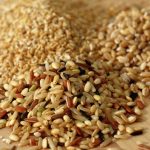
Looking for a simple yet delicious way to enjoy whole grains? Start with nutritious, easy-to-cook barley, a great swap for processed grains like white rice. When shopping, choose hulled barley instead of pearl. Hulled barley retains more of the outer bran layer with its fiber and nutrients. Pearl parley has had most of the bran layer “polished” off. Hearty barley is a staple in Europe. In the United States, it’s often used as an ingredient in soups and stews, but there’s no reason to relegate it to those dishes. To cook barley for a fast breakfast or side dish, for every two servings, use a half-cup barley to a cup and a half of water. Bring to a boil, reduce to a simmer, cover and cook until the grains are tender and most of the water has evaporated. Top with cinnamon in the morning or herbs for dinner — it’s that versatile. But don’t stop there. Try this twist on traditional risotto for a one-pot meal. Mushroom Barley “Risotto” 1 cup dry hulled barley 2 tablespoons olive oil 1/2 red onion, minced 3 garlic cloves 5 ounces mushrooms, such as button or crimini, sliced 1 cup chicken or vegetable broth 1/2 cup grated Parmesan cheese 2 ounces goat cheese, crumbled 1/4 cup fresh basil, chopped 2 teaspoons thyme leaves, chopped Place the barley in a… read on >

















